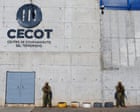
In a rapidly changing global landscape, significant developments are unfolding across various continents. Prioritizing human rights and ethical aspects of technology, as well as adapting to societal shifts, countries are making crucial decisions that affect their citizens and the international community at large.
In El Salvador, the Cecot facility has come under scrutiny following calls for investigation by U.S. Congresswoman Delia Ramirez. The congresswoman has urged a congressional hearing into the use of federal funds to detain immigrants at this secretive terrorism prison. The facility, which gained attention following the United States’ initiative to send nearly 300 immigrants there after the commencement of Donald Trump’s second presidency, is now facing allegations of human rights abuses. Ramirez’s appeal to the US House’s homeland security committee reflects broader concerns about transparency and human rights adherence in international agreements.
Meanwhile, in New Zealand, a debate is underway over proposed changes to the country’s electoral laws. Prime Minister Christopher Luxon’s administration is defending its plan to reform what it describes as “outdated and unsustainable” electoral laws. Significant measures include the closing of voter enrolment 13 days before election day and reinstating a total ban on voting by prisoners. These changes have raised alarms, with the attorney general warning they might breach human rights laws and disenfranchise over 100,000 Māori voters. The government, however, insists that the reforms are necessary to maintain the integrity and efficiency of the electoral process.
In Australia, discussions on crime rates have become a focal point following claims by Queensland’s government of a decrease in crime victims. Premier David Crisafulli has emphasized his commitment to reducing the crime rate, aligning it with his election promise. Nonetheless, the Labor opposition accuses his administration of selectively interpreting data to present favorable outcomes. These contrasting perspectives highlight the challenges of accurately portraying societal issues while maintaining political accountability.
In the realm of technology and ethics, Pope Leo XIV has voiced concerns regarding artificial intelligence and its potential impact on human dignity. Speaking at the first-ever mass for Catholic digital influencers, the Pope emphasized that nothing emanating from human creativity should compromise the dignity of others. This cautionary message underscores an ongoing dialogue about balancing technological advancements with ethical considerations, emphasizing the responsibility to ensure that innovation respects human values and rights.
Across these varied scenarios, a common thread emerges: the importance of safeguarding human rights and dignity in society. Whether in diplomatic dealings, national policy reform, or technological advancement, the core principles of transparency, inclusion, and respect remain indispensable. While the specifics may vary, these universal values serve as a guiding beacon in navigating contemporary challenges, fostering a more harmonious global community.
Source: {link}
